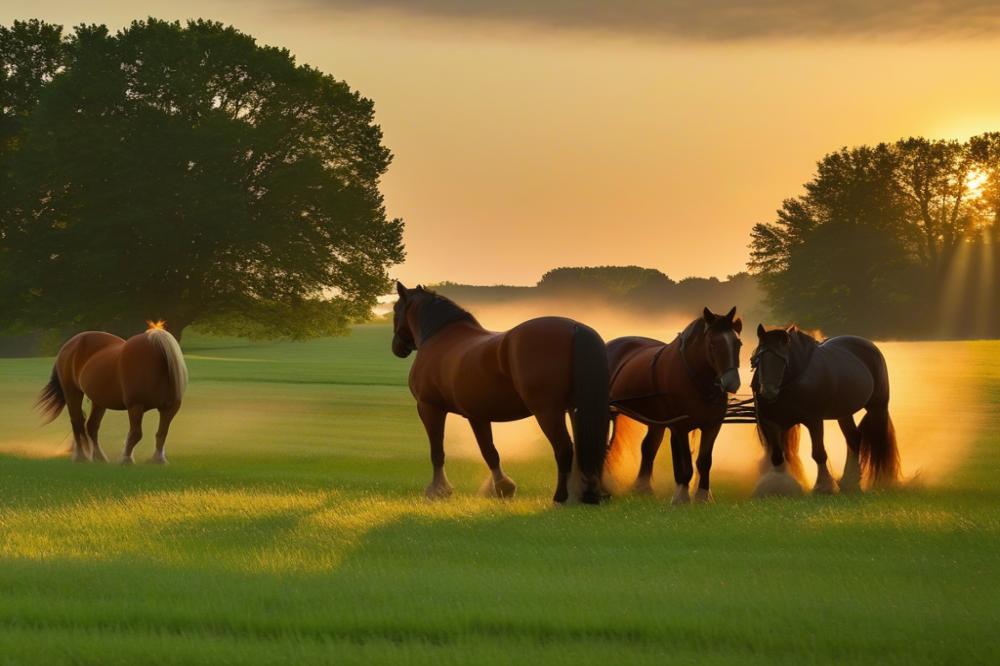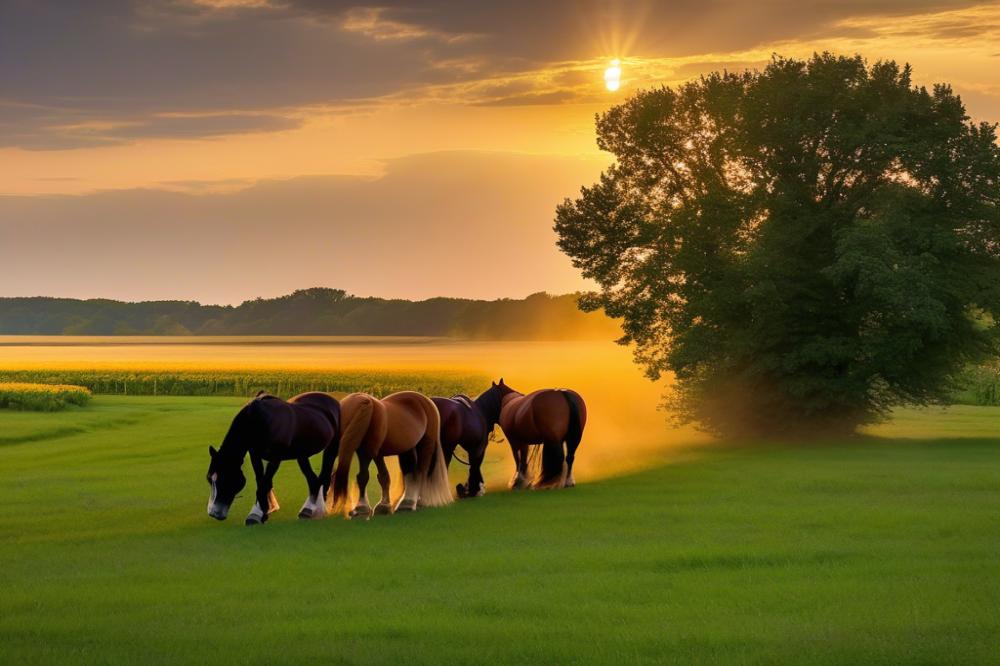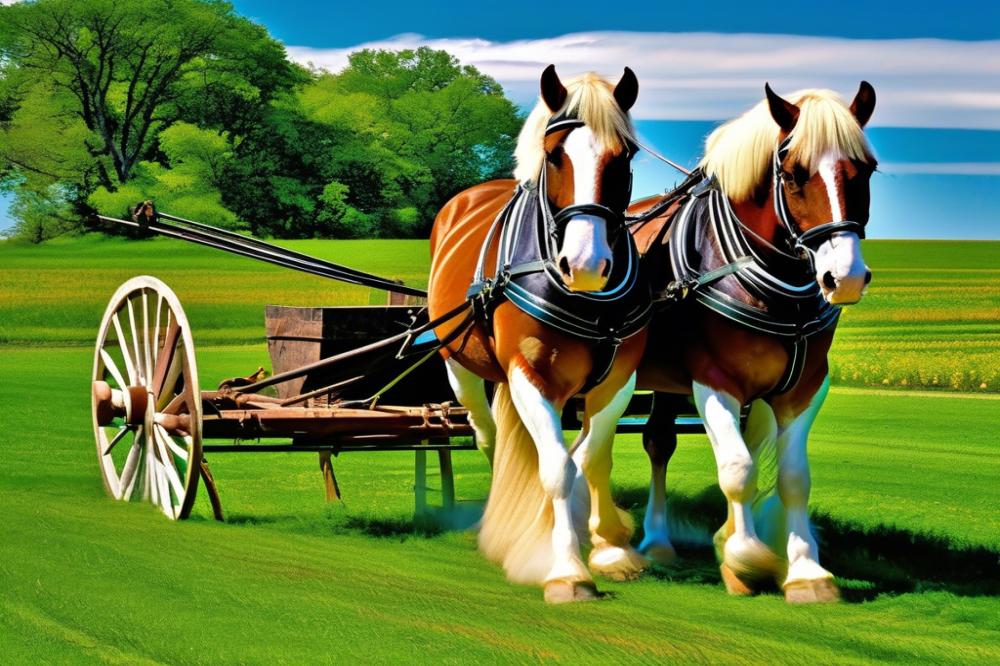Draft Horses of the Midwest: The Backbone of Traditional Farming in Iowa
Throughout American history, animals have played a crucial role in agriculture. Among them, some of the most remarkable are the powerful workhorses that have assisted farmers for generations. These animals, including the majestic Draft Horses, have been essential for many farming practices. They offered muscle for plowing fields, transporting goods, and more. Without these animals, the landscape of American farming would look quite different.
In the Midwest, especially in Iowa, these horses have a rich legacy. Farmers relied on their strength to help cultivate the land and sustain their operations. Each horse shows a connection to the past while also bringing a sense of pride to rural communities. Families often share stories of how these magnificent creatures shaped their livelihoods. Recognizing their contribution helps us appreciate the core of agricultural traditions in this region.
Understanding the significance of these horses reaches beyond agriculture. It dives deep into the heart of rural community life. Farmers and townsfolk value the connection between their heritage and the animals that helped them thrive. When examining the landscape today, the role of draft horses cannot be overlooked. They embody a spirit of resilience and dedication seen in Midwest farming.
The Role of Draft Horses in Iowa Agriculture

Draft horses played a crucial role in the agricultural history of Iowa. Before the rise of modern machinery, farmers relied on these large and strong animals for many farming tasks. In the late 19th century, when mechanization started, horses were still a common sight in the fields. They plowed, harrowed, and transported goods, effectively becoming the engines of early farms.
Traditional Farming techniques using horses involved a variety of practices. Farmers often used teams of two or four horses to work the land. A simple plow could be attached behind the animals, allowing them to cultivate the soil efficiently. In addition, horses helped in planting crops and hauling produce to markets. Farmers maintained a close bond with their teams. Such relationships were essential for the success of the farm.
Horsepower vs. Mechanized Equipment
Comparing horsepower to mechanized equipment reveals both advantages and disadvantages. Horses required care and attention, such as feeding and grooming, but they could work in conditions where machines struggled. For example, soft and muddy fields often limited the use of tractors. Farm equipment could not operate well without damaging the land.
However, tractors offered increased speed and efficiency. With the right machinery, a single farmer could do the work that once required multiple hands. Yet the charm of draft horses remains. They symbolize a connection to the earth and the rhythms of nature.
Iowa farmers face decisions regarding how to manage their farms today. Understanding the benefits of both methods is important. While mechanization clearly changed agriculture, many still appreciate the tradition of using horses. They evoke a nostalgic memory of hard work, commitment, and harmony with the land.
Heritage Breeds of Draft Horses

Across Iowa, several breeds of draft horses stand out. Each one has its own characteristics and strengths. The Percheron is one of the most common. Known for their strength and gentle nature, these horses are often seen working in fields. Clydesdales, with their impressive stature and long feathering on their legs, are another breed familiar to many. Heavyweights like the Belgian draft horse show a remarkable ability to pull and carry heavy loads. Their sheer size and friendly demeanor make them popular among farmers.
Preserving these heritage breeds goes beyond nostalgia. Sustainable farming relies on the skills and traits that these horses bring. They help to reduce dependence on fossil fuels and provide a natural alternative for fieldwork. Traditional farming practices benefit from their abilities. By maintaining the genetic diversity of these breeds, farmers can protect farming methods that have been passed down through generations. This ensures healthier ecosystems for future harvests, making farming more resilient.
These powerful horses play a pivotal role in farm life. They contribute not just to labor but to the culture and traditions of rural communities. Events like county fairs and parades often showcase these magnificent animals, fostering a sense of pride among local farmers. The bond between families and their horses runs deep. Many artisans and tradespeople rely on them, creating a vibrant network of shared history and practice.
In addition, the community enjoys gathering to celebrate the skills of these breeds. Such gatherings foster relationships among farmers and promote a deeper understanding of agriculture’s roots. Whether pulling a plow or standing proudly in a show ring, these horses embody the spirit of Iowa’s farming past and present. Their presence continues to inspire and shape regional traditions.
Sustainable Farming and Draft Horses
Using strong animal power brings many benefits to sustainable farming practices. Traditional methods are gaining popularity as farmers seek to reduce their reliance on fossil fuels. Draft horses provide an alternative source of power for tasks like plowing, harrowing, and even pulling wagons. This shift supports healthier soil and reduces compaction compared to heavy machinery.
Many farmers appreciate the fuel-free aspect of using these animals. Diesel engines consume resources and contribute to pollution, while horses depend on grass and grains. The environmental impact is lessened by harnessing living creatures instead of machines to do the work. Moreover, many believe that horses create a connection to the land that machines simply cannot replicate.
Additionally, the cost benefits can be substantial. Diesel prices fluctuate, but the feed for a working horse is often more predictable. Farmers who utilize these animals often report lower overall expenses. Equipment maintenance also takes a backseat, as caring for horses typically means fewer mechanical breakdowns to deal with.
The relationship between farmers and these gentle giants often fosters community bonds. Neighbors may join together for plowing days or harvest festivals. Sharing knowledge and resources promotes camaraderie amongst agriculturalists dedicated to sustainable practices. This human-animal connection highlights the values of cooperation and appreciation for the environment.
Observing the operations of modern farms utilizing animal power reveals their commitment to sustainability. The rhythm of horse-drawn plowing has a certain charm not found in modern machinery. As more individuals recognize the benefits, interest continues to grow. Ultimately, a blend of tradition and innovation holds promise for the future of farming.
Draft Horses and Rural Community Life
In rural Iowa, draft horses carry deep cultural roots. They symbolize a time when farming relied heavily on animals for hard work. Many families still hold a special place in their hearts for these gentle giants. For generations, these strong horses have been integral to daily farm life, shaping traditions and relationships in the community.
Cultural Significance
These magnificent animals connect people to the past. They remind farmers of the hard work and dedication that has characterized Midwestern life. When children see horses plowing fields, they are often filled with wonder. Stories of teamwork and cooperation often surround old farming tales. The bond between families and their horses fosters a sense of belonging that is hard to replicate.
Community Events and Traditions
Every summer, towns celebrate their agricultural heritage with festivals. Events include horse pulls, where weight is lifted by teams of Draft horses. Community members gather to cheer, creating a lively atmosphere. These occasions also spotlight parades featuring beautifully decorated horses. Neighbors share laughter and stories, strengthening community ties. Participants often reminisce about their childhoods while watching these pulls.
Stories from Farmers and Families
In many households, tales of horses passed down through generations hold great significance. Farmers often recount their first experiences with the horses they trained. A common thread in these retellings is the mutual respect between man and beast. One farmer recalls spending hours in the barn with his horse. Care and companionship cultivated a lasting friendship. Families often wish to keep the tradition alive, passing it on to the next generation.
Having worked side by side, farmers hold a profound appreciation for the loyalty of their horses. They describe the satisfaction of harvest season when teamwork shines brightest. In many cases, they believe these animals were as much a part of the family as anyone else. After a day of hard work, sitting in the barn, the gentle sounds of horses provide comfort and peace. Daily life remains tied to the rhythm of farm chores and the horses that help with them.
Wrap-Up: Honoring Our Agricultural Heritage
Draft horses have played a vital role in shaping the agricultural landscape of Iowa and the broader Midwest. Their strength, reliability, and gentle nature have made them indispensable partners for farmers, especially in traditional practices. As modern techniques emerge, it’s essential to recognize the history and traditions these magnificent animals represent.
Looking ahead, the role of these majestic creatures may evolve, but their essence remains important. More farmers are beginning to appreciate the benefits of using them in sustainable farming practices. This shift can promote a deeper connection to the land, showing respect for the past while nurturing the future.
Our responsibility is to support the preservation of these traditions. Local events, educational programs, and community initiatives can keep the spirit of draft horse farming alive. It’s crucial to celebrate not just the horses but also the dedicated people who continue this beautiful legacy. Whether through volunteer work or simply attending a local fair, everyone can contribute to this cause.
By embracing the timeless bond between farmer and horse, we can secure a unique place for this tradition in the hearts of future generations. Recognizing their significance today will help maintain the rich agricultural heritage for years to come. Together, let’s ensure that the mighty draft horse remains a cherished part of Iowa’s farming story.



